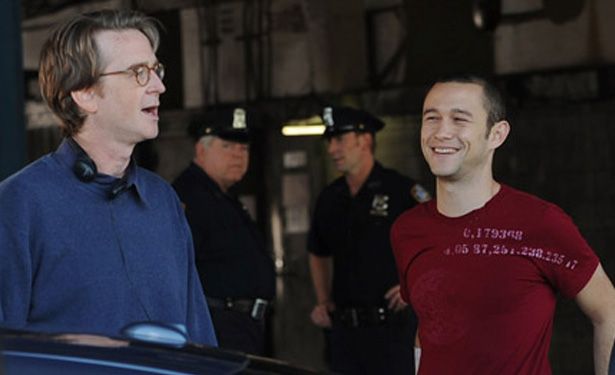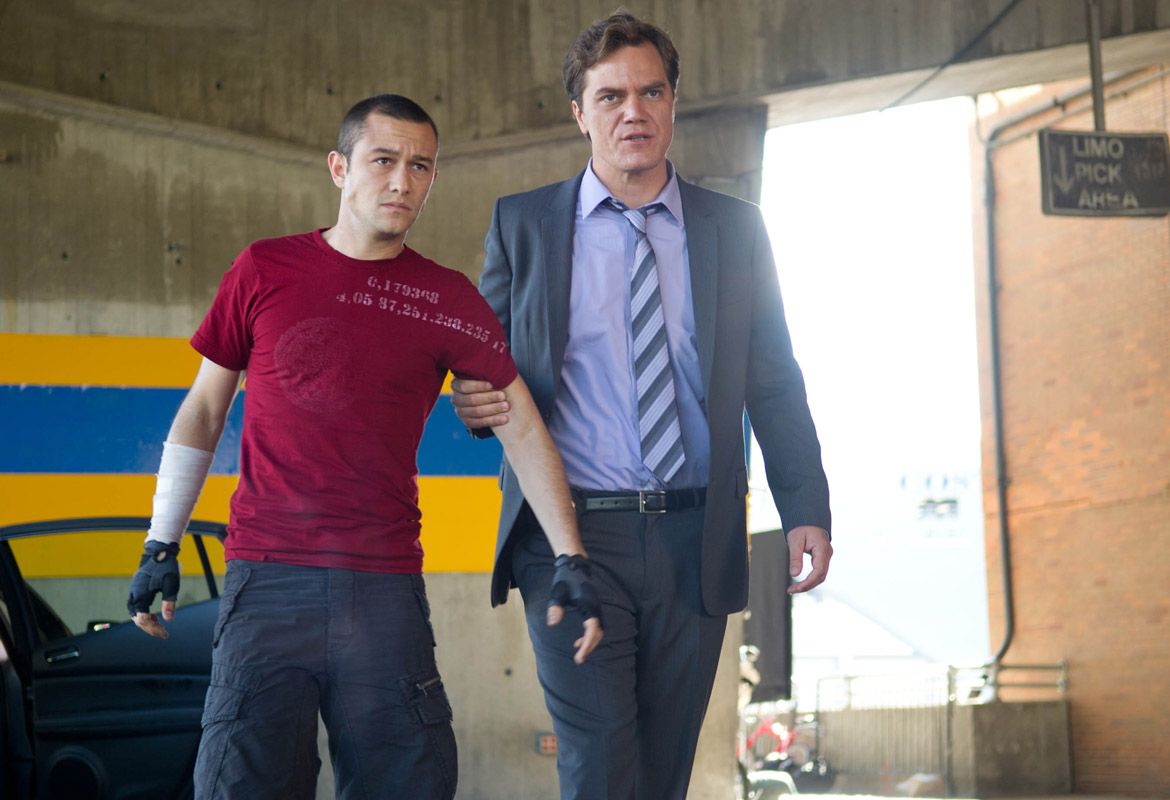Consider a thriller set on the streets of New York City, told from the perspective of a bike messenger. Now add that it’s written and directed by Jurassic Park and Spider-Man scribe David Koepp and stars Joseph Gordon-Levitt as adrenaline-junkie courier Wilee, with Michael Shannon in a gloriously unhinged role as a villainous cop. Then clinch it with some pretty righteous stunts, point of view-style camerawork and a fun, early ‘90s-style tongue-in-cheek tone, and you have Premium Rush.
Spinoff Online spoke with Koepp and Gordon-Levitt while they were in New York promoting the film, and they touched upon keeping things legit while making a movie about the city, learning stunts from real-life bike messengers, balancing safety concerns with acting performances and whether Koepp’s Panic Room script was based on a rumored safe room in his own house.
Spinoff: It's refreshing, as a New Yorker, to see a movie that actually nails New York. Usually it's so obviously a sound stage, or the navigational logic is all wrong.
David Koepp: Because there's no lies! Well, okay, there's two.
Pray tell, what are they?
Koepp: One is the trestles on Broadway are 10 blocks north of Columbia. And in fact, he would've been going south.
Joseph Gordon-Levitt: That's right!
Koepp: We went back and forth on it a lot and finally said, “Fuck it, they look great. We'll pretend they're 10 blocks south.” And then, I think the police station – surprisingly they don't let you shoot in actual police stations! Where are their priorities, man? [laughs] So that's somewhere else than we say it is. But everything else we wanted to really shoot where we said we were.
Well, we can chalk it up to additional authenticity that you're a Columbia alum, Joseph, just like your character Wilee.
Gordon-Levitt: That's true! I lived in New York for years, and the first place I ever lived was in a dorm room on that campus. And there we were, uh, 10 years later? Yeah, 10 years later! Shooting the movie.
Koepp: That's kind of fun! And a dream you don't imagine.
Gordon-Levitt: Yeah!
It's very full-circle! So, David, where did this movie live in your brain? Did you have a particularly disastrous or memorable experience with a courier that sparked the screenplay?
Koepp: I'd written Panic Room, which was all in one location. And I wanted a bottle, you know, a movie that takes place amongst certain really strict constraints. And I wanted to do another one of those, and to me the bottle this time was going to be time and a guy getting from point A to point B. And so I kept thinking of it in my head as a map movie. And I live in New York, so bike messengers almost hit me all the time. I can't say it's a traumatic experience, but you do wonder in that moment, as they pass your nose, what makes a person want to do that?
Did you guys embed yourself with couriers here in New York for research?
Gordon-Levitt: Yeah. I have four doubles in this movie, and all four of those guys have their own specialties. One's a Hollywood stuntman who's good at getting hit by cars, one's good at riding a track bike and doing tricks on it, one's good at doing tricks on a trials bike, and the fourth guy, who's named Austin Horse, is a bike messenger.
He was your stunt double, but he’s also currently a working bike messenger here in New York? That's wild!
Gordon-Levitt: Yeah!
Koepp: He's an interesting guy. He walked into the pre-production office one day -- he was delivering some bikes -- and we just started talking. And he said he was a messenger also, and then it sort of came out that he's the fastest human being on a bike in the world.
He just dropped that knowledge on you, along with his delivery?
Koepp: [laughs] Well, we kept poking and poking, because he's a very humble, quiet guy. So he became one of our principal stunt riders – he was the speed guy. Every stunt rider had a different thing: the crash guy, the speed guy, the trials, the jumps.
Joseph, you clearly pushed yourself physically for this role, but I have to admit I was most impressed by the ease and flair you used just stopping your bike with no brakes. Was it harder, in some ways, to master those small things in order to make them look like second nature?
Gordon-Levitt: Yeah, that's what I wanted to do. And I did learn to ride a fixed-gear bike, which is different than the bikes you learn riding growing up as a kid. You can skid on a fixie, because on a normal bike, if you stop the pedals it just coasts. I remember when I was learning how to do it we would start on places in Central Park where there was a lot of gravel, and the bike slides easier. I rode every day for six weeks leading up to shooting, and wanted to get fit enough that I wouldn't have to make a whole film crew wait for me to catch my breath.
Speaking of catching your breath: There's a lot of dialogue while you're riding a bike in this movie. How did you prepare for the endurance of that – did you run lines on a stationary bike?
Koepp: The first thing was, everybody who signed on had to get in great shape, because you're not only going to be exercising for 10 to 12 hours a day on some days, but you have to act at the same time. And the second thing was, you have to cordon off a part of your brain to your personal safety.
Gordon-Levitt: I'd do my homework, make sure I could do these scenes very easily so I could focus on the riding and making sure it all looked good and was safe. And in fact, when you do that it's a big boon for the performance because acting's always best when you're not thinking about what you're doing.
David, did you feel an added burden as a director, having to take more ownership of everyone's personal safety so they could focus on their performances?
Koepp: Yeah! Any time that somebody gets hurt, and that was, like, often, you really feel terrible -- because it's only a movie! And I would just pray no one would die, because that's a terrible way to die -- for a movie. So you have a real sense of responsibility. But also you're constantly in this thing of, “I'm really concerned about your safety and I don't want you to get hurt, I wonder – could you ride a little faster? [laughs] It would look awesome!”
Michael Shannon is so brilliantly unhinged as this movie's villain. What made you take notice of him as being perfect for the role?
Koepp: He came to my broad attention in Revolutionary Road – he was so striking. I even remember him in Pearl Harbor! He scores – quietly sometimes, noisily other times – in everything he's in. We had the luxury, with him, he wasn't on a bike, so he'd be talking in a room sometimes or on a street that was closed and I'd do three or four takes and then I'd just keep going and say, "Do something else!"
Ah, so did a lot of his scenes involve improvisation?
Koepp: To a certain extent, yes. I think that as a director, you want that.
But you're also the writer, so did you feel torn in that vein – perhaps a bit protective of the material?
Koepp: My rule always is I need at least one the way we wrote it. And also, a lot of new stuff sometimes seems better just because it's new and you’re not sick of it. But you don't ever want to stop somebody from that. It has to be fun for everybody.
Gordon-Levitt: There's certain scripts where I'm like, "I'm going to basically stick to this,” because it's just really well-written. And there's other scripts where you're like, "I like this script – this phrasing, I'm going to maybe be more liberal with it." And this was definitely one of the scripts where it seemed to me I was going to stick with it. [to David] You have a great way of writing dialogue.
Joseph, you pick really eclectic roles and switch up between small- and larger-scale movies – it's really admirable. So, aside from working with David and liking the script, is there anything else that drew you to this one?
Gordon-Levitt: When I first read the script, I was in the middle of shooting 50/50, where I was playing a guy fighting cancer, and his body was giving up on him. So to play someone who's healthy and confident in his body, and go get in shape and ride a bike around New York City all summer, sounded like the perfect way to come out of the headspace of, "Am I going to die of cancer?"
David, a friend told me that Panic Room was based on a real safe room in your house. Is that true?
Koepp: No, not in my house! But they are real, those rooms. I was remodeling a townhouse at the time here in New York, and it was killing me. And I thought – one day, in frustration – I'm going to make this fucker pay for itself! And so that's why. But I don't have an actual panic room! [laughs]
Premium Rush opens today nationwide.



